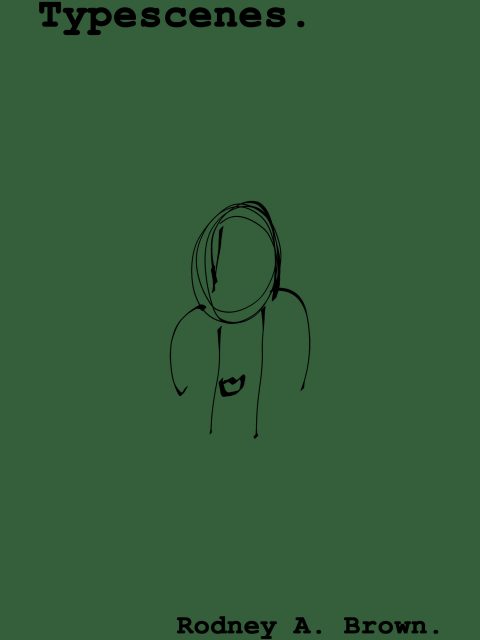Typescenes was a finalist for the Eric Hoffer Grand Prize and the new Eric Hoffer prize, the Medal Provocateur.
The Award committee called it “arresting poems of travailing through life in a black body, in a queer body, in a woman’s body, in a prisoner’s body, and ultimately in a dying body. This book is radical and courageous in its perspective with an eye toward a brave new world of language possibility.”

“Rodney A. Brown is a stunningly honest and searingly urgent poet. His vision developed in racism, homophobia, and homelessness; his training as dancer and choreographer honed a sublime sense of music, proportion, and timing. This singular book is a miracle and a gift. The demand it poses is nothing less than to face what holds us back from being human.”
–Annie Finch, author of Spells
“Typescenes challenges us with images we would rather not see. Rodney A. Brown conjures in song, dance, and word those of the beloved community who should have lived, but were destroyed by white supremacy.”
–Maurice Carlos Ruffin, author of We Cast a Shadow
The first thing you need to know about Typescenes is that you can dance to it. Martin Mull is said to have coined the dismissive aphorism, “writing about music is like dancing about architecture.” Many beautiful minds continue to write about music, but fewer have the nerve to dance to other art forms, despite the fact that a glorious building, like a profound work of literature, is worth dancing about. Fewer still have the nerve to create a non-musical work designed for dancing. Typescenes is such a work; some thirty-nine pages of dense language about which, as the founder of The Brown Dance Project, our Author has danced; about which our Author has invited others to dance.
This might be new to some readers, but our Author is versed in the intersection of text and dance. We refer you to our Author’s translation of the POA Module on HIV Education into dance. The POA Module on HIV Education, developed by Nesha Z. Haniff, is a method to raise HIV awareness in low-literate populations; it is highly accessible public health information. Dr. Haniff has encouraged translations of the Module into various spoken languages; it did not occur to her that our Author would translate the Module into dance. But in 2014 in New Delhi, our Author performed h(is)er choreography of the Module. This remarkable, and ultimately pedagogically useful, translation can be examined at The Brown Dance Project. I would suggest this work—the communication through dance of public health information—directly informs Typescenes.
The second thing you need to know about Typescenes is that it is necessarily a treatise on American Black male mental health. While our Author’s own gender identity is fluid and playful, (s)he is well-versed in the traumas experienced by American Black men. In this sense, Typescenes is not only an accompaniment to our Author’s choreographic work, but a continuation of it; it, like the Author’s translation of the Module, is public health information. To be clear, this treatise is poetic. Like the choreography of Typescenes, the simple reading of Typescenes requires, as Dr. Detrixhe says in his Foreword, an active collaboration between our Author and you, our Reader. The knowledge in Typescenes cannot be simply “banked” in the Freireian sense, but must be engaged with. Through this engagement, our Author’s treatise can be understood and valued as a medical text.
The third thing you need to know about Typescenes is that it is a collection of prose poems that can and should be read for experiential pleasure. Originally a single scroll, the poet Annie Finch worked with our Author to create its current form, a brief literary collection. Although it requires engagement, Typescenes requires no poetic education; it is immediately accessible and enjoyable as art, beautifully presented and thematically relevant to casual and committed readers.
Unlikely Books is a publisher of the arts, and it is thus with pleasure and pride that we note that our Author trusted us with this multifaceted manuscript. It is in this spirit of pleasure and excitement that we bring it to you, Reader, in the hopes that you will receive its extensive offerings. We believe it deserves multiple readings, and we can’t wait for you to experience it as we do.